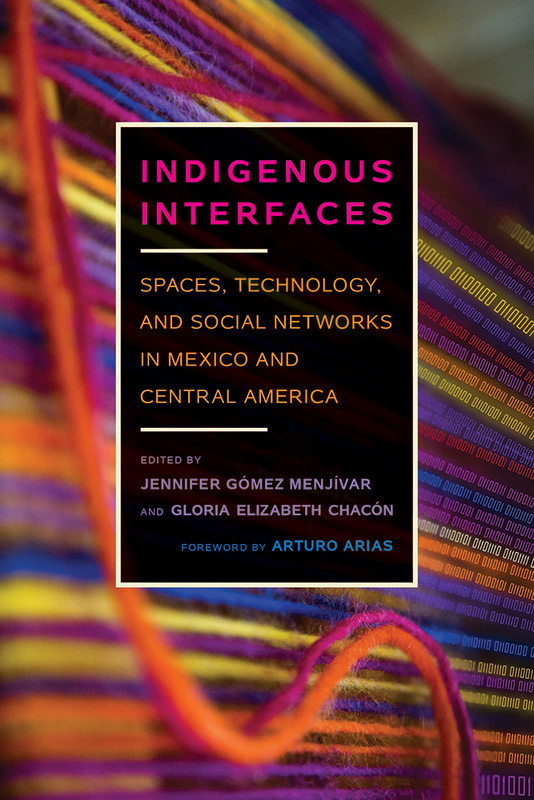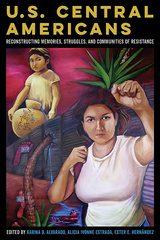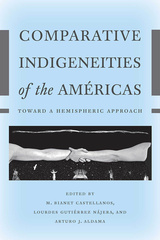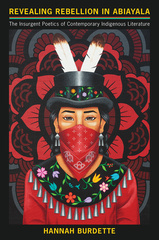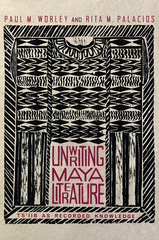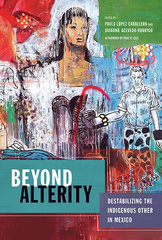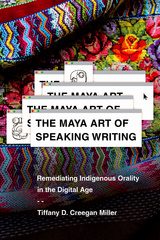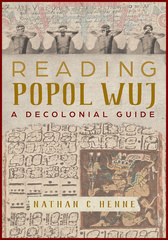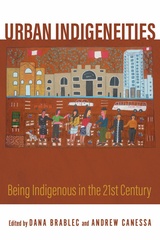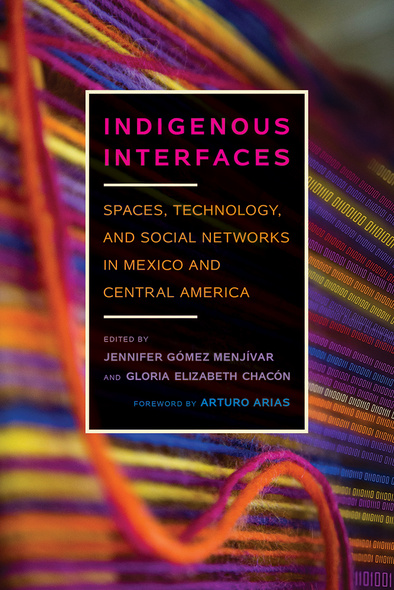
304 pages, 6 x 9
24 b&w illustrations, 1 map, 8 tables
Paperback
Release Date:07 May 2019
ISBN:9780816538003
Indigenous Interfaces
Spaces, Technology, and Social Networks in Mexico and Central America
Edited by Jennifer Gómez Menjívar and Gloria Elizabeth Chacón
The University of Arizona Press
Cultural preservation, linguistic revitalization, intellectual heritage, and environmental sustainability became central to Indigenous movements in Mexico and Central America after 1992. While the emergence of these issues triggered important conversations, none to date have examined the role that new media has played in accomplishing their objectives.
Indigenous Interfaces provides the first thorough examination of indigeneity at the interface of cyberspace. Correspondingly, it examines the impact of new media on the struggles for self-determination that Indigenous peoples undergo in Mexico and Central America. The volume’s contributors highlight the fresh approaches that Mesoamerica’s Indigenous peoples have given to new media—from YouTubing Maya rock music to hashtagging in Zapotec. Together, they argue that these cyberspatial activities both maintain tradition and ensure its continuity. Without considering the implications of new technologies, Indigenous Interfaces argues, twenty-first-century indigeneity in Mexico and Central America cannot be successfully documented, evaluated, and comprehended.
Indigenous Interfaces rejects the myth that indigeneity and information technology are incompatible through its compelling analysis of the relationships between Indigenous peoples and new media. The volume illustrates how Indigenous peoples are selectively and strategically choosing to interface with cybertechnology, highlights Indigenous interpretations of new media, and brings to center Indigenous communities who are resetting modes of communication and redirecting the flow of information. It convincingly argues that interfacing with traditional technologies simultaneously with new media gives Indigenous peoples an edge on the claim to autonomous and sovereign ways of being Indigenous in the twenty-first century.
Contributors
Arturo Arias
Debra A. Castillo
Gloria Elizabeth Chacón
Adam W. Coon
Emiliana Cruz
Tajëëw Díaz Robles
Mauricio Espinoza
Alicia Ivonne Estrada
Jennifer Gómez Menjívar
Sue P. Haglund
Brook Danielle Lillehaugen
Paul Joseph López Oro
Rita M. Palacios
Gabriela Spears-Rico
Paul Worley
Indigenous Interfaces provides the first thorough examination of indigeneity at the interface of cyberspace. Correspondingly, it examines the impact of new media on the struggles for self-determination that Indigenous peoples undergo in Mexico and Central America. The volume’s contributors highlight the fresh approaches that Mesoamerica’s Indigenous peoples have given to new media—from YouTubing Maya rock music to hashtagging in Zapotec. Together, they argue that these cyberspatial activities both maintain tradition and ensure its continuity. Without considering the implications of new technologies, Indigenous Interfaces argues, twenty-first-century indigeneity in Mexico and Central America cannot be successfully documented, evaluated, and comprehended.
Indigenous Interfaces rejects the myth that indigeneity and information technology are incompatible through its compelling analysis of the relationships between Indigenous peoples and new media. The volume illustrates how Indigenous peoples are selectively and strategically choosing to interface with cybertechnology, highlights Indigenous interpretations of new media, and brings to center Indigenous communities who are resetting modes of communication and redirecting the flow of information. It convincingly argues that interfacing with traditional technologies simultaneously with new media gives Indigenous peoples an edge on the claim to autonomous and sovereign ways of being Indigenous in the twenty-first century.
Contributors
Arturo Arias
Debra A. Castillo
Gloria Elizabeth Chacón
Adam W. Coon
Emiliana Cruz
Tajëëw Díaz Robles
Mauricio Espinoza
Alicia Ivonne Estrada
Jennifer Gómez Menjívar
Sue P. Haglund
Brook Danielle Lillehaugen
Paul Joseph López Oro
Rita M. Palacios
Gabriela Spears-Rico
Paul Worley
The articles in this book engender, sustain, and add a new and first-person Indigenous perspective to an all-too-often entrenched Western discourse in media,
technology, and communications'.—Hondo Baldwin Louis, Tribal College Journal
‘This volume’s spectacular breadth and depth of scholarship from many disciplines, as well as a diverse representation of Indigenous peoples and technologies, make it a much-needed contribution to the growing field of Indigenous technologies and futurisms.’—Kelly S. McDonough, University of Texas at Austin
‘This is an excellent and timely book, well-written and conceived, clear, and meaningful. Each contributor brings new research to the discussion while engaging with applicable scholars and critics.’ —Elizabeth C. Martinez, DePaul University
Jennifer Gómez Menjívar is an associate professor of Spanish and Latin American studies at the University of Minnesota Duluth. She is the co-author of Tropical Tongues: Language Ideologies, Endangerment, and Minority Languages in Belize.
Gloria Elizabeth Chacón is an associate professor in the Literature Department at University of California, San Diego. She is the author of Indigenous Cosmolectics: Kab’awil and the Making of Maya and Zapotec Literatures.
Gloria Elizabeth Chacón is an associate professor in the Literature Department at University of California, San Diego. She is the author of Indigenous Cosmolectics: Kab’awil and the Making of Maya and Zapotec Literatures.
Arturo Arias
Acknowledgments
Introduction: No Static: Re-Indigenizing Technology
Jennifer Gómez Menjívar and Gloria Elizabeth Chacón
PART I. PROBLEMATIZING TECHNOLOGY
1. (Re)Technologizing the Word: Recording, Knowledge, and the Decolonial Aesthetics of Maya Ts’íib
Paul M. Worley and Rita M. Palacios
2. Dule Molas: The Counterpoint-Counterplot Practice of the Traversable Cloth in (Non)Digital Realms
Sue P. Haglund
3. Using Technology to Revitalize Endangered Languages: Mixe and Chatino Case Studies
Emiliana Cruz and Tajëëw Robles
PART II. CYBERSPATIAL NATION BUILDING
4. YouTubing Maya Rock: B’itzma Sobrevivencia’s Aural Memory of Survival
Alicia Ivonne Estrada
5. Trafficked Babies, Exploded Futures: Jayro Bustamante’s Ixcanul
Debra A. Castillo
6. Joysticks and Jaguars: Bribri-Inspired Games in Neoliberal Costa Rica
Mauricio Espinoza
PART III. INDIGENIZING SOCIAL MEDIA
7. Digitizing Ancestral Memory: Garifuna Settlement Day in the Americas and in Cyberspace
Paul Joseph López Oro
8. In a Time of War and Hashtags: Rehumanizing Indigeneity in the Digital Landscape
Gabriela Spears-Rico
9. Tweeting in Zapotec: Social Media as a Tool for Language Activism
Brook Danielle Lillehaugen
10. From Facebook to Ixamoxtli: Nahua Activism through Social Networking
Adam Coon
Contributors
Index

